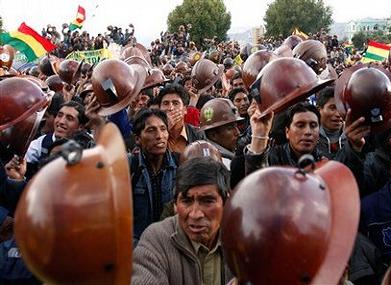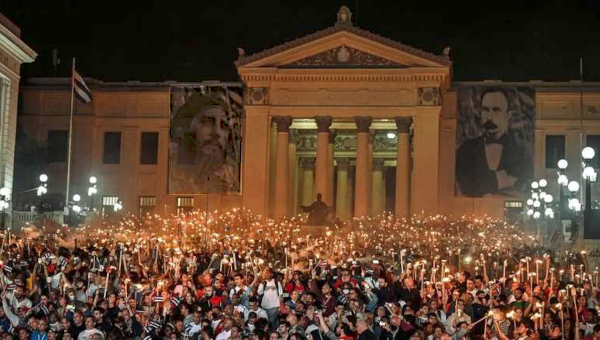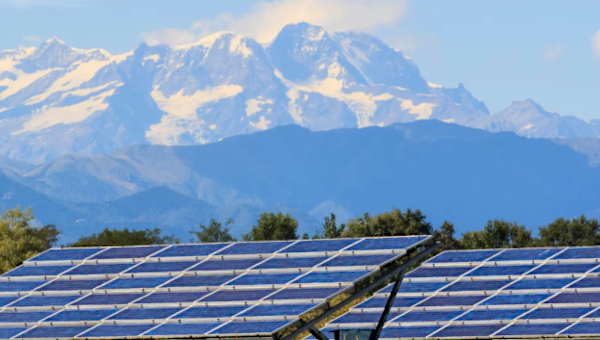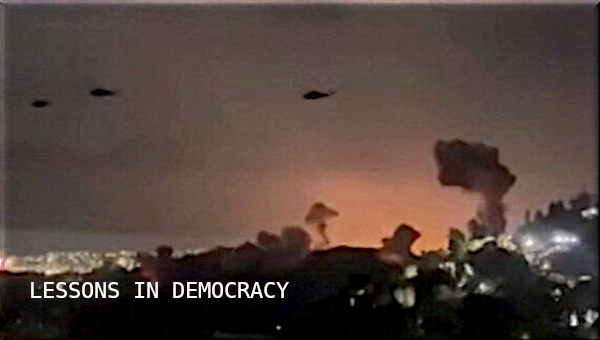From Red October to Evo Morales
The Politics of Rebellion and Reform in Bolivia
David Broder, of The Commune, interviews Jeffery R. Webber on his two books on Bolivian politics out this year – From Rebellion to Reform in Bolivia: Class Struggle, Indigenous Liberation and the Politics of Evo Morales and Red October: Left-Indigenous Struggles in Modern Bolivia.
David Broder (DB): What kind of politics did the 2000-2005 movements in Bolivia express? Was it a general desire for socialism, or was it conditioned by the historically strong Trotskyist current in Bolivia? Are indigenous people’s demands of specific importance?
JRW: The politics articulated through the movements of the 2000-2005 revolutionary epoch in Bolivia are best conceived through what I call the “combined oppositional consciousness” of their leading layers of activists and organizers. This consciousness drew on the two most important popular cultures of resistance and opposition in the last few centuries in the Bolivian context – an eclectic politics of revolutionary Marxism and indigenous liberation. These traditions were adapted and combined – not without tension and contradiction – in novel ways to the twenty-first century environs of urban shantytowns, mining enclaves, and the largely indigenous countryside.

Combined Consciousness
The combined consciousness I’m talking about was characterized by a complex critique of imperialism, capitalism, and racist domination, seen together as integral components of a singular, intertwined system that had to be defeated in its totality, rather than each ingredient one by one, or through distinct stages to be played out over an extended historical period. It’s true that, historically, Trotskyism was the dominant force within revolutionary Bolivian Marxism, but organized Trotskyists played a very marginal role in the latest series of revolts in the country. Some of the best residual ideas and practices of Trotkyism continued to reverberate in activist circles, though, if under different descriptive rubrics.
Indigenous demands for liberation, against what was effectively a ethno-racial regime of informal apartheid, cannot, in my view, be separated out from the wider anti-capitalist and anti-imperialist struggle that was taking shape in these years. We are talking about a profoundly racialized capitalism of a specific character, existing within a particular subordinated country, which is, in turn, inserted into the lowest echelons of the hierarchy of the world capitalist system. Subjectively, this condition is revealed in the minutiae of the daily lives of workers. The activists I spoke to in the leading city of revolt – El Alto – thought of themselves, for example, as workers and indigenous (principally Aymara, but also Quechua) simultaneously. They weren’t workers in some parts of their lives, and indigenous in others. To paraphrase one militant I spoke to, the urban Bolivian proletariat in El Alto has an indigenous colour.
DB: How does the programme of the Evo Morales government differ from the mass movements against previous governments?
JRW: I see a real break between the revolutionary epoch of 2000 to 2005, in which popular struggles from below threw up the possibility of a fundamental, transformative overhaul of social, economic, and political structures, and the period beginning in late 2005, when the movements were redirected through complex mechanisms back into the domesticated terrain of electoral politics, and the Morales government assumed office in January 2006.
On the one hand, the MAS election represented a democratic gain in race relations and a consolidation of what had been a growing sense of indigenous pride in the majority of the popular classes over the preceding decade. On the other hand, in terms of its economic orientation, the MAS had drifted from an anti-neoliberal and anti-imperialist party in the late-1990s, to a modestly reformist one by the 2005 elections. This had to do in part with the changing class composition of the party over time, a composition much more heavily determined, after 2002, by an urban middle class social layer.
Strategically, the party also reoriented itself, increasingly directing its energies toward winning elections, and steadily deflecting them away from extra-parliamentary struggle and the building of popular power capacities from below.
Predictably, once in office, Morales instituted what I suggest is best understood as a reconstituted neoliberalism. Relatively superficial policy initiatives have been introduced that run against orthodox neoliberalism. These include increases in taxes and royalties in the hydrocarbons (natural gas and oil) sector, and a modest increase in direct state presence in the economy as a proportion of the country’s GDP. These policy changes appear rather more significant than they actually are because they were initially accompanied by a major commodities boom, between 2003 and 2008, which generated fairly substantial increases in state revenue. This same boom affected other countries in the region, regardless of the ostensible political persuasion of different governments.
Like orthodox neoliberalism, the new inflections of the old genre remain preeminently concerned with the restoration of profitability and the subordination of the working class. Setting aside for a moment any crude suggestion that the Morales regime has a socialist orientation, we fail even to see any substantive change in poverty and inequality levels, for example.
We have also witnessed a sustained commitment to fiscal austerity, low-inflationary growth, central bank independence, labour market “flexibility,” inconsequential “agrarian reform,” vast accumulation of international reserves, low social spending, alliance with transnational capital across all sectors of the economy, alliance with “patriotic” sections of the eastern lowland bourgeoisie, export-oriented capitalism premised on low-wage labour, documented increases in rates of exploitation of the working class, state investment amounting to only 32 per cent of total investment, with a maximum official goal of 36 per cent, and so on and so forth.
Despite the nominal inclusion of revolutionary slogans in the discourse of the President and his allies, the working class has begun to learn, through bitter experience, the depth of continuities between this phase of capitalist accumulation in Bolivia, and what came before.
DB: Perhaps the most exciting – and unique – characteristics of the 2000-2005 movements in Bolivia was the extent of mass mobilization from below, and the radicalism of wide layers of the population. Why has this mobilization declined? If Morales’ vote is now at almost two-thirds of the electorate, isn’t he doing what they want?
JRW: The mass mobilization from below and the incredibly wide layers of radicalism in the popular classes were indeed the most inspiring and hopeful aspects of the Bolivian insurrectionary period at the outset of this century. They routinely shut down the country, and overthrew two neoliberal presidents in under two years – Gonzalo Sánchez de Lozada in October 2003, and Carlos Mesa in June 2005.
Although it’s often a trite, evasive technique deployed by sectarians to avoid real political discussion, nonetheless I think we need to consider seriously the impact of the absence of a revolutionary party in explaining the failure of the 2003 and 2005 mass mobilizations to translate into an overthrow of the existing capitalist state and the construction of a popular, sovereign, self-governing power of the indigenous proletarian and peasant majority from below. The left-indigenous movements demonstrated an absolutely impressive capacity to mobilize huge numbers, and to bring to a halt the production and circulation of commodities at the heart of normal capitalism in Bolivia. They did so for weeks at a time, several times a year, with certain key moments characterized by explosive popular eruptions, and hundreds of thousands in the streets of what is, indeed, a very small country. Nonetheless, the left-indigenous forces lacked a revolutionary party that might have provided the necessary leadership, strategy, and ideological coherence to transition from revolt to popular power.
In the absence of such an entity, the MAS of Evo Morales, which had until then been tailing rather than leading the insurrections, was able to fill the void and refocus popular energies on elections that had been pushed forward to December 2005. Today in Bolivia, a situation persists in which there is no organized, alternative socio-political force to the left of the ruling party. Meanwhile, the popular sectors are rightly concerned with defending the Morales regime against any imperialist meddling and right-wing efforts at destabilization when they emerge.
All the same, the reconstituted neoliberalism characteristic of the current regime has also meant the gradual emergence of cracks and conflicts in its edifice. Confrontations in the mining sector since as early as 2006, social revolts in Cochabamba in early 2007, a rebellion of the poor in the destitute state of Potosí last (Southern) winter, health care worker, teacher, and factory worker strikes in May last year, and, most recently, the major unrest against the ending of fuel subsidies by the Morales regime in December 2010, known as the gasolinazo, are a few of the more significant displays of discontent and disaffection.
DB: What progressive measures has the government enacted?
JRW: I think it’s a mistake in general to look at this or that policy measure in isolation from the overall class character and composition of the regime in its totality. To the extent that we enter into this sort of analysis, we play into the divide and rule tactics of the government vis-à-vis the popular classes, whereby certain sectors are handed petty subsidies or reforms in order to best effect the division of working-class opposition to the general continuity of neoliberalism of a reconstituted type.
Nonetheless, coming to office as it did on a wave of popular revolt, it is important to note that the government was forced to institute a number of basic policy shifts. Most obvious are the changes to the hydrocarbons sector. These reforms in no way constituted “nationalization,” but they did increase taxes and royalties going to the state. Such measures were particularly significant, as I suggested earlier, in the context of a spike in natural gas prices in recent years.
The Morales government has also developed a relatively more independent foreign policy, evidenced, for example, through its frostier relationship with the international financial institutions – particularly the International Monetary Fund – and closer ties to Venezuela, Ecuador, and Cuba.
The most recent progressive stance on the international stage was the move by the Morales administration to host a major anti-capitalist gathering in Cochabamba last year, in response to the pathetic Copenhagen debacle in December 2009. This was a genuine step forward for the construction of internationalist, eco-socialist networks, but the domestic character of the regime would have to be fundamentally transformed for this to be consistent with the rhetoric of the Cochabamba gathering.
Foreign policy, furthermore, is itself chock full of contradictions. The Morales regime continues to participate in the occupation of Haiti, and the befriending of vile regimes, such as Iran, Libya, and others.
DB: To what extent is the Morales’ government’s relative caution conditioned by foreign threats and pressures?
JRW: Obviously, imperialism was and is a major issue for any left project – socialist or moderate – seeking to advance in a subordinate country like Bolivia. The country is forced to operate within an imperial hierarchy of states in the world system, and is subject to the market imperatives of global capitalism. Ultimately, for any nationally-based revolutionary alternative to capitalism to succeed it would have to extend regionally and globally. Activists in the Global North should, in this context, take as their first priority in regard to Bolivia, opposition to any and all imperialist intervention, whether it takes an economic, political, or military form.
Having set out that backdrop, however, it is also important to recognize that there was substantial room for manoeuvre at the moment when the Morales government first assumed office. The U.S. was overextended in Iraq and Afghanistan, and the IMF and World Bank’s control of Latin America and the Caribbean had receded dramatically since the 1990s – in part due to alternative lines of credit provided to left-leaning regimes by Venezuela, through the distribution of oil rents, at a time of extreme spikes in oil prices on the world market. The domestic right, always a preferred channelling vessel of imperialism short of overt intervention, had been politically destroyed. Even if capitalists still owned and controlled the country’s economy, they had no political project. The legitimacy of neoliberalism had been devastated under the weight of its own contradictions.
Instead of seeing this historical window as an opportunity to advance rapidly, and to encourage the self-organization and self-activity of the oppressed and exploited to act out against foreign and national capitals, the Morales government instead fell into ritual elite negotiations with a right wing whose power it vastly overestimated.
Over time, that right wing, while still relatively weak and divided at the moment, has built up an autonomist movement in the eastern lowlands, and is sporadically capable of destabilization. This capacity perhaps reached its last peak in August and September 2008, through an orchestrated campaign of racist intimidation occurred throughout the lowlands, culminating in the seizure of several airports by proto-fascist autonomists and the brutal massacre of dozens of peasants in the state of Pando on September 11th of that year.
A legitimate fear today is that the increasing class conflict generated by five years of MAS administration of a capitalist state, and the perpetuation of reconstituted neoliberal rule and unmet popular needs, might as easily fuel the rearticulation of right-wing political forces as a left-wing alternative to the MAS. •
Resources on Bolivia:
- LeftStreamed No. 75: On Bolivia with Dr. Hugo Salvatierra.
- Bullet No. 404: Two Takes on the Bolivian Uprising in Potosi.
- Pablo Solón, From Water Wars to the Fight for Climate Justice, Bullet No. 390, 12 July 2010.
- Gustavo Martínez interviewed by Susan Spronk and Jeffery R. Webber, Workers’ Control and the Contradictions of the Bolivarian Process, Bullet No. 374, 21 June 2010.
- Federico Fuentes, Bolivia: When Fantasy Trumps Reality, Bullet No. 362, 29 May 2010.





